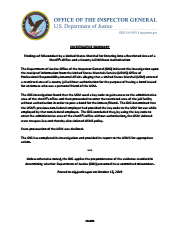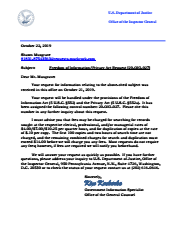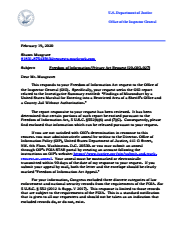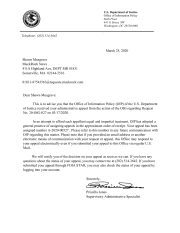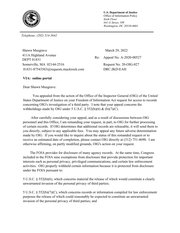DOJ OIG — USMS Entering into a Restricted Area of a Sheriff’s Office and a County Jail Without Authorization
| Tracking # |
20-OIG-027, A-2020-00527 20-OIG-027 |
| Submitted | Oct. 16, 2019 |
| Due | Nov. 14, 2019 |
| Est. Completion | None |
MuckRock users can file, duplicate, track, and share public records requests like this one. Learn more.
Communications
From: Shawn Musgrave
To Whom It May Concern:
Pursuant to the Freedom of Information Act, I hereby request the following records:
A copy of the OIG final report regarding findings that a United States Marshal entered into a restricted area of a county jail to post a bond for a friend. These findings were summarized in a press release attached (also available here: https://oig.justice.gov/reports/2019/f191015.pdf).
The requested documents will be made available to the general public.
In the event that there are fees, I would be grateful if you would inform me of the total charges in advance of fulfilling my request. I would prefer the request filled electronically, by e-mail attachment if available or CD-ROM if not.
Thank you in advance for your anticipated cooperation in this matter.
I look forward to receiving your response to this request within 20 business days, as the statute requires.
Sincerely,
Shawn Musgrave
From: Department of Justice, Office of the Inspector General
Your user account in the FOIAonline application has been reset. (https://www.foiaonline.gov/foiaonline/action/public/login)
Username: requests@muckrock.com
Temporary password: 6e5d4491-f421-4
After successfully logging in, you'll be asked to change this password before continuing.
From: Department of Justice, Office of the Inspector General
Hello:
Attached is the OIG’s acknowledgment of your FOIA request.
Thank you.
-

~WRD000
From: Muckrock Staff
To Whom It May Concern:
I wanted to follow up on the following Freedom of Information Act request, copied below, and originally submitted on Oct. 16, 2019. Please let me know when I can expect to receive a response. You had assigned it reference number #20-OIG-027.
Thanks for your help, and let me know if further clarification is needed.
From: Muckrock Staff
To Whom It May Concern:
I wanted to follow up on the following Freedom of Information Act request, copied below, and originally submitted on Oct. 16, 2019. Please let me know when I can expect to receive a response. You had assigned it reference number #20-OIG-027.
Thanks for your help, and let me know if further clarification is needed.
From: Department of Justice, Office of the Inspector General
Hello:
Attached is the OIG’s response to your FOIA request.
Thanks.
-

image001
From: Shawn Musgrave
To Whom It May Concern:
I hereby appeal the extensive redactions throughout the OIG's response to FOIA 20-OIG-027, not only under the FOIA statute but particularly in light of the D.C. Circuit Court of Appeals ruling in BARTKO v. UNITED STATES DEPARTMENT OF JUSTICE (D.C. Cir. 2018) (attached). The D.C. Circuit's ruling regarding the Justice Department's Office of Professional Responsibility's inappropriate application of Exemptions 6 and 7(C) apply equally to the OIG's misuse of these same exemptions in the present FOIA concerning a Senate-confirmed United States Marshal.
As OPR did in the Bartko case, here OIG failed to sufficiently justify its invocation of the cited exemptions, particularly with regard to Exemption 6 and Exemption 7(C).
The D.C. Circuit panel ruled in Bartko that OPR was generally barred from invoking Exemption 7(C), noting that the agency's focus is on the "internal monitoring end of the spectrum, where Exemption 7(C) has no purchase." The D.C. Circuit found that OPR's attempts to invoke law-enforcement records exemptions were not only "exaggerated," but further did not "rise above the ephemeral." Upon considering OPR's function, the Court found OPR's review process to be "several steps removed" from functions "that could warrant Exemption 7(C) protection," and that such functions are "not nearly enough to trigger Exemption 7(C)."
This applies equally to the Office of the Inspector General, which is also several steps removed from law enforcement functions that might result in criminal or civil sanctions. The report indicates that OIG's findings in the present case were referred to the relevant U.S. Attorney's office and county prosecutor's office. Under the analysis applied in Bartko, this is not enough to warrant extensive redactions under Exemption 7(C). In light of the Bartko decision, then, I assert that OIG's "attempt to shield its records under Exemption 7(C) merits no deference." OIG cannot justify the extensive redactions it made pursuant to Exemption 7(C), nor has it attempted to do so beyond cursory recitation of the statutory standard.
As to OIG's reliance on Exemption 6, under the Bartko ruling, the "same reasoning dooms [... the] invocation of Exemption 6 [...] as an alternative ground for withholding responsive records," because Exemption 6 "requires an even stronger demonstration of a privacy interest" than Exemption 7(C). "[A]n agency's inability to justify withholding the latter often precludes it from satisfying Exemption 6's heightened requirements," the D.C. Circuit ruled. The OIG cannot justify the extensive redactions it made pursuant to Exemption 6, nor has it attempted to do so beyond cursory recitation of the statutory standard.
Even if the OIG asserts it can meet the requisite threshold to invoke either Exemption 7(C) or Exemption 6 so broadly, it also bears the burden of "making an across-the-board showing that the privacy interest the government asserts categorically outweighs any public interest in disclosure," per the Bartko ruling. It cannot make such a showing here, nor has it attempted to do so. As in Bartko, here the OIG "just sweepingly asserted" that redacted portions of responsive documents would be an unwarranted invasion of the subject attorney's privacy. As the D.C. Circuit found was true for OPR's response to Bartko's FOIA, here the OIG "ignores altogether its obligation to specifically identify the privacy interest at stake, which can vary based on many factors, including frequency, nature, and severity of the allegations."
As OPR did in Bartko, here the OIG made "no apparent effort to weigh any privacy interest against the countervailing public interest in the disclosure of information" concerning findings of misconduct by a Senate-confirmed United States Marshal. An agency "cannot issue a blanket proclamation that a loss of privacy would be 'unwarranted' without considering whether there is a public interest that might well warrant it," the D.C. Circuit ruled.
And as OPR did with Bartko's FOIA request, the OIG here attempted no such balancing analysis in response to the present FOIA. Had it done so, the public interest would certainly outweigh any privacy interest the subject attorney might hold in keeping their name "in the free-and-clear." The D.C. Circuit specifically found in Bartko that "supervisory responsibility comes with an increased public interest." As noted in my initial appeal, the investigative subject herein is a U.S. Marshal who was vetted by the White House, the Senate Judiciary Committee, and the full U.S. Senate and is one of the chief U.S. law enforcement officials in a federal judicial district. The D.C. Circuit Court of Appeals considered this balancing analysis to demolish any attempt to withhold records under either Exemption 7(C) or Exemption 6.
I respectfully request that this FOIA be remanded to the OIG for good faith search and provision of responsive records with minimal redactions.
Best,
Shawn Musgrave
From:
The Office of Information Policy has received your FOIA Appeal. Please see the attached acknowledgment letter.
From: Department of Justice, Office of the Inspector General
Your FOIAonline user account for requests@muckrock.com will be deactivated in 5 days due to inactivity.
From: Department of Justice, Office of the Inspector General
Your FOIAonline user account for requests@muckrock.com has been deactivated due to inactivity.
From: Department of Justice, Office of the Inspector General
The Office of Information Policy has made its final determination on your FOIA Appeal Number A-2020-00527 . A copy of this determination is enclosed for your review, along with any enclosures, if applicable. Thank you.
From: Muckrock Staff
To Whom It May Concern:
I wanted to follow up on the following Freedom of Information Act request, copied below, and originally submitted on Oct. 21, 2019. Please let me know when I can expect to receive a response. You had assigned it reference number #20-OIG-027, A-2020-00527.
Thanks for your help, and let me know if further clarification is needed.
From: Muckrock Staff
To Whom It May Concern:
I wanted to follow up on the following Freedom of Information Act request, copied below, and originally submitted on Oct. 21, 2019. Please let me know when I can expect to receive a response. You had assigned it reference number #20-OIG-027, A-2020-00527.
Thanks for your help, and let me know if further clarification is needed.
From: Muckrock Staff
To Whom It May Concern:
I wanted to follow up on the following Freedom of Information Act request, copied below, and originally submitted on Oct. 21, 2019. Please let me know when I can expect to receive a response. You had assigned it reference number #20-OIG-027, A-2020-00527.
Thanks for your help, and let me know if further clarification is needed.
From: Muckrock Staff
To Whom It May Concern:
I wanted to follow up on the following Freedom of Information Act request, copied below, and originally submitted on Oct. 21, 2019. Please let me know when I can expect to receive a response. You had assigned it reference number #20-OIG-027, A-2020-00527.
Thanks for your help, and let me know if further clarification is needed.
From: Muckrock Staff
To Whom It May Concern:
I wanted to follow up on the following Freedom of Information Act request, copied below, and originally submitted on Oct. 21, 2019. Please let me know when I can expect to receive a response. You had assigned it reference number #20-OIG-027, A-2020-00527.
Thanks for your help, and let me know if further clarification is needed.
From: Muckrock Staff
To Whom It May Concern:
I wanted to follow up on the following Freedom of Information Act request, copied below, and originally submitted on Oct. 21, 2019. Please let me know when I can expect to receive a response. You had assigned it reference number #20-OIG-027, A-2020-00527.
Thanks for your help, and let me know if further clarification is needed.
From: Muckrock Staff
To Whom It May Concern:
I wanted to follow up on the following Freedom of Information Act request, copied below, and originally submitted on Oct. 21, 2019. Please let me know when I can expect to receive a response. You had assigned it reference number #20-OIG-027, A-2020-00527.
Thanks for your help, and let me know if further clarification is needed.
From: Muckrock Staff
To Whom It May Concern:
I wanted to follow up on the following Freedom of Information Act request, copied below, and originally submitted on Oct. 21, 2019. Please let me know when I can expect to receive a response. You had assigned it reference number #20-OIG-027, A-2020-00527.
Thanks for your help, and let me know if further clarification is needed.
From: Muckrock Staff
To Whom It May Concern:
I wanted to follow up on the following Freedom of Information Act request, copied below, and originally submitted on Oct. 21, 2019. Please let me know when I can expect to receive a response. You had assigned it reference number #20-OIG-027, A-2020-00527.
Thanks for your help, and let me know if further clarification is needed.
From: Muckrock Staff
To Whom It May Concern:
I wanted to follow up on the following Freedom of Information Act request, copied below, and originally submitted on Oct. 21, 2019. Please let me know when I can expect to receive a response. You had assigned it reference number #20-OIG-027, A-2020-00527.
Thanks for your help, and let me know if further clarification is needed.
From: Muckrock Staff
To Whom It May Concern:
I wanted to follow up on the following Freedom of Information Act request, copied below, and originally submitted on Oct. 21, 2019. Please let me know when I can expect to receive a response. You had assigned it reference number #20-OIG-027, A-2020-00527.
Thanks for your help, and let me know if further clarification is needed.
From: Muckrock Staff
To Whom It May Concern:
I wanted to follow up on the following Freedom of Information Act request, copied below, and originally submitted on Oct. 21, 2019. Please let me know when I can expect to receive a response. You had assigned it reference number #20-OIG-027, A-2020-00527.
Thanks for your help, and let me know if further clarification is needed.
From: Muckrock Staff
To Whom It May Concern:
I wanted to follow up on the following Freedom of Information Act request, copied below, and originally submitted on Oct. 21, 2019. Please let me know when I can expect to receive a response. You had assigned it reference number #20-OIG-027, A-2020-00527.
Thanks for your help, and let me know if further clarification is needed.
From: Muckrock Staff
To Whom It May Concern:
I wanted to follow up on the following Freedom of Information Act request, copied below, and originally submitted on Oct. 21, 2019. Please let me know when I can expect to receive a response. You had assigned it reference number #20-OIG-027, A-2020-00527.
Thanks for your help, and let me know if further clarification is needed.
From: Muckrock Staff
To Whom It May Concern:
I wanted to follow up on the following Freedom of Information Act request, copied below, and originally submitted on Oct. 21, 2019. Please let me know when I can expect to receive a response. You had assigned it reference number #20-OIG-027, A-2020-00527.
Thanks for your help, and let me know if further clarification is needed.
From: Muckrock Staff
To Whom It May Concern:
I wanted to follow up on the following Freedom of Information Act request, copied below, and originally submitted on Oct. 21, 2019. Please let me know when I can expect to receive a response. You had assigned it reference number #20-OIG-027, A-2020-00527.
Thanks for your help, and let me know if further clarification is needed.
From: Muckrock Staff
To Whom It May Concern:
I wanted to follow up on the following Freedom of Information Act request, copied below, and originally submitted on Oct. 21, 2019. Please let me know when I can expect to receive a response. You had assigned it reference number #20-OIG-027, A-2020-00527.
Thanks for your help, and let me know if further clarification is needed.
From: Muckrock Staff
To Whom It May Concern:
I wanted to follow up on the following Freedom of Information Act request, copied below, and originally submitted on Oct. 21, 2019. Please let me know when I can expect to receive a response. You had assigned it reference number #20-OIG-027, A-2020-00527.
Thanks for your help, and let me know if further clarification is needed.
From: Muckrock Staff
To Whom It May Concern:
I wanted to follow up on the following Freedom of Information Act request, copied below, and originally submitted on Oct. 21, 2019. Please let me know when I can expect to receive a response. You had assigned it reference number #20-OIG-027, A-2020-00527.
Thanks for your help, and let me know if further clarification is needed.
From: Muckrock Staff
To Whom It May Concern:
I wanted to follow up on the following Freedom of Information Act request, copied below, and originally submitted on Oct. 21, 2019. Please let me know when I can expect to receive a response. You had assigned it reference number #20-OIG-027, A-2020-00527.
Thanks for your help, and let me know if further clarification is needed.
From: Muckrock Staff
To Whom It May Concern:
I wanted to follow up on the following Freedom of Information Act request, copied below, and originally submitted on Oct. 21, 2019. Please let me know when I can expect to receive a response. You had assigned it reference number #20-OIG-027, A-2020-00527.
Thanks for your help, and let me know if further clarification is needed.
From: Muckrock Staff
To Whom It May Concern:
I wanted to follow up on the following Freedom of Information Act request, copied below, and originally submitted on Oct. 21, 2019. Please let me know when I can expect to receive a response. You had assigned it reference number #20-OIG-027, A-2020-00527.
Thanks for your help, and let me know if further clarification is needed.
From: Muckrock Staff
To Whom It May Concern:
I wanted to follow up on the following Freedom of Information Act request, copied below, and originally submitted on Oct. 21, 2019. Please let me know when I can expect to receive a response. You had assigned it reference number #20-OIG-027, A-2020-00527.
Thanks for your help, and let me know if further clarification is needed.
From: Muckrock Staff
To Whom It May Concern:
I wanted to follow up on the following Freedom of Information Act request, copied below, and originally submitted on Oct. 21, 2019. Please let me know when I can expect to receive a response. You had assigned it reference number #20-OIG-027, A-2020-00527.
Thanks for your help, and let me know if further clarification is needed.
Files
pages
